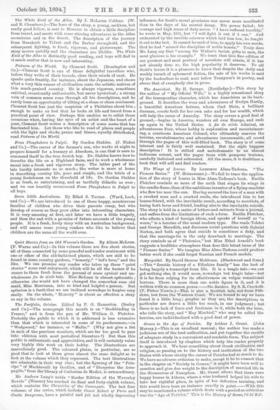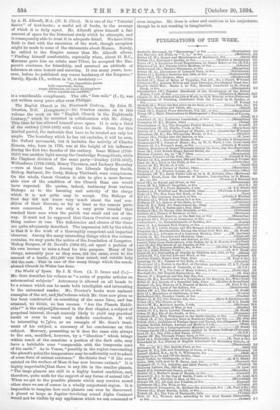Greece in the Age of Pericles. By Arthur J. Grant.
(John Murray.)—This is an excellent manual; the author has made a judicious use of the best authorities, and put together the results of adequate study in a convenient and readable form. The subject itself is introduced by chapters which help the reader properly to approach it. We bear something about Greek civilisation and religion, so passing on to the history and institution of the two States with whose rivalry the career of Pericles had so much to do. We have no adverse criticism to make, except it be to remark that in the chapter on "Society in Greece," it might have been well to mention and give duo weight to the description of married life in the Economicus of Xenophon. Mr. Grant allows that there were happy homes in Athens, where a wise husband helped his wife to take her rightful place, in spite of her defective training, and this would have been an instance exactly in point.—With this may be mentioned a volume which deals with a period as critical as was the "Age of Pericles." This is the History of Borne, 78-81 B.C.
by A. H. Allcroft, M.A. (W. B. Clive). It is one of the "Tutorial Series" of text-books ; a useful set of books, to the average of which it is fully equal. Mr. Alloroft gives himself a fair amount of space for the historical study which he attempts, and is consequently able to treat it in adequate detail. We have little fault to find with the execution of the work, though exception might be made to some of the statements about Horace. Surely, he rallied to the Empire sooner than Mr. Allcroft allows. "Finding himself comfortable, especially when, about 31 B.C., Mascenas gave him an estate near Tibur, he accepted the Em- peror's overtures for friendship, and assumed an attitude of tolerance at once honest and amusing. It was many years, how- ever, before he published any verses laudatory of the Emperor." Surely, Epode IX., written in 3], is laudatory :—
" nee Ingurtldno pare= bell° reportasti, dncem,
neque Afrioanum cni super Karthaginem virtns eepulehrmia oondiclit,"
is a considerable compliment. The ode," lam sails" (I., 2), was not written many years after even Philippi.





































 Previous page
Previous page